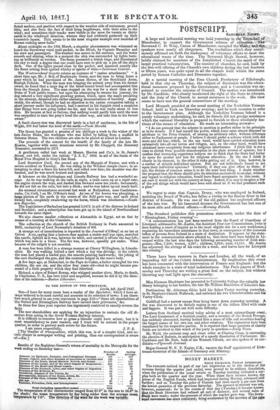POSTSCRIPT.
SATU AY NIGIrr.
A large and influential meeting was held yesterday in t Town-hall of -t • ;2- Manchester, to support the Government scheme of ed tion. The Reverend C. D. Wray, Canon of Manchester, occupied thelktair; and Oita, .a.s/ speakers were nearly all clergymen. The resolutions which they unani- mously affirmed set forth the inadequacy of voluntary efforts to meet the educational wants of the time. The Reverend Hugh Stowel, however, boldly claimed for members of the Established Church the merit of the larger practical voluntaryism. The number of churches, he said, built by the free-will offering of the Church's own children during the last fourteen or fifteen years, was quite equal to all the chapels built within the same period by Roman Catholics and Dissenters together.
At a special meeting of the Free Church Presbytery of Edinburgh, held in that city on Thursday, the subject of discussion was the educa- tional measures proposed by the Government; and a Committee was ap- pointed to consider the minutes of Council. The motion was introduced by Dr. Candlish; who clearly inculcated the right of the State to educate, and the duty of the Church to accept assistance in the work. His view seems to have met the general concurrence of the meeting.
Lord Morpeth presided at the usual meeting of the Yorkshire Yeoman School, held in York on Thursday evening; and he took occasion to refer to the Government plan. Although the Yorkshire Yeoman School is a purely voluntary undertaking, he said, its friends did not grudge assistance which the national liberality is prepared to furnish to those absolutely des- titute of the means of education. He made an interesting avowal-
" I do not pretend that the scheme in question is perfect either in its principle or in its details. If I had myself the power, which some seem almost disposed to attribute to the Privy Council, of issuing an arbitrary edict, without reference either to Parliament or people, I believe I should prefer a scheme which both did more and did less; which, on the one hand, would have carried education more extensively into all our towns and villages, and, on the other hand, would have abstained more completely from any religions interference. I think this is not a time to shrink from possible misconception in the plain avowal of opinion; but I confess that increasing experience induces me to think that the State had better do more for secular and less for religious education. In the one I think it clearly in its element, in the other it risks getting out of it. This, however, is a matter of strictly individual opinion. But are not individuals bound to act
upon their individual opinions Certainly, if they can give effect to them; if not, the dictate of common sense is to do the next best thing. I doubt whether the proposal that the State should give its attention exclusively to secular, without any regard to religious edneation, would have found acceptance in this room. I am sure it would not with the country at large. Indeed, it is easy to imagine a few of the soft things which would have been said about us if we had produced such a plan."


























 Previous page
Previous page